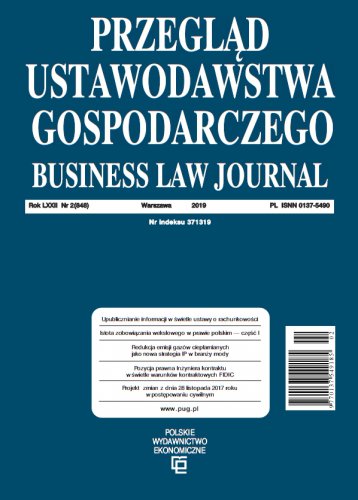Ethics of artificial intelligence in the financial sector
The application of artificial intelligence in finance is one of the new issues which, in addition to regulatory challenges of hard law nature, raise ethical questions. This study deals with the subject of ethical aspects of the use of artificial intelligence in the financial sector, which is becoming more and more common, and therefore sometimes "invisible" to the end user. Examples of its use can be found, among others in risk assessment models or systems for detecting fraudulent transactions and counteracting money laundering and terrorist financing. Increasingly, they are also used to assess the creditworthiness of a potential borrower or provide investment advice. In the latter cases, transparency and ethics take on a special meaning, because they directly "touch" the human sphere and can significantly affect the observance of fundamental rights. At the same time, finding the "happy medium" that will not only balance various interests, but also be realistic to implement, is not an easy task. It is often emphasized in the literature that today there is no positive (any?) Effect on the implementation of many postulates in the field of ethical AI (Dubber et al., 2020), in connection with the use of various codes of ethics or good practices, which are more based on the so-called self-regulation or self-governance, that is, self-determination practices that are then audited by the settler. At the same time, the dynamic development of algorithms, especially those that make (to some extent) autonomous decisions, means that supervision — also ethical — cannot be temporary, but should be carried out continuously (Lo Piano, 2020), which only exacerbates the already existing problems related to algorithmisation.
References
Bibliografia/References
Literatura/Literature
Al-Blooshi, L., Nobanee, H. (2020). Applications of Artificial Intelligence in Financial Management Decisions: A Mini-Review. SSRN Electronic Journal, (February). https://doi.org/10.2139/ssrn.3540140
Anderson, M., Anderson, L. S. (2007). Machine Ethics: Creating an Ethical Intelligent Agent. AI Magazine, 28(4), https://doi.org/10.1609/aimag.v28i4.2065
Armstrong, P. (2019). RegTech and SupTech — change for markets and authorities, ESMA Report on Trends, Risks and Vulnerabilities, No. 1.
BaFin (2021). Big data and artificial intelligence: Principles for the use of algorithms in decision-making processes, Bundesanstalt fur Finanzdienstleistungsaufsicht (BaFin), https://www.bafin.de/SharedDocs/Downloads/EN/Aufsichtsrecht/dl_Prinzipienpapier_BDAI_en.html (30.11.2021).
Chong, D. (2017). Ethics on Robo-advisors and its big data, https://www.researchgate.net/publication/351019909_Ethics_on_Robo-advisors_and_its_big_data_Introduction_and_background?enrichId=rgreq-ff6acab663b65b23bc668f7eeaa5cc05-XXX&enrichSource=Y292ZXJQYWdlOzM1MTAxOTkwOTtBUzoxMDE0ODczNDM3Nzc3OTI1QDE2MTg5NzYwOTE1ODg%3D&el=1_x_2&_esc=publicationCoverPdf (05.08.2021).
Dalvinder, S. G. (2014). A Critical Conceptual Analysis of Definitions of Artificial Intelligence as Applicable to Computer Engineering, IOSR Journal of Computer Engineering, 16(2), 9–13.
Dignum, V. (2019). Responsible Artificial Intelligence. How to develop and use AI in a responsible way. Springer.
Dubber, M. D., Pasquale, F., Das, S. (2020). The Oxford Handbook of Ethics of AI. Oxford: Oxford University Press. https://doi.org/10.1093/oxfordhb/9780190067397.001.0001
Duda, T. (2016). Standardy etyki zawodowej profesjonalistów na rynkach finansowych w Polsce i na świecie a kwestia zaufania do instytucji rynków finansowych, Prace Naukowe Uniwersytetu Ekonomicznego we Wrocławiu, (462).
European Commission (2020). Communication from the Commission to the European Parliament, the Council, the European Economic and Social Committee and the Committee of the Regions on a Digital Finance Strategy for the EU, COM(2020) 591 final.
European Commission (2021). Proposal for a regulation of the European Parliament and of the Council laying down harmonised rules on artificial intelligence (artificial intelligence act) and amending certain union legislative acts, COM(2021) 206 final 2021/0106 (COD).
European Equality Law Network (2020). Algorithmic discrimination in Europe Including summaries in English, French and German Challenges and opportunities for gender equality and non-discrimination law. European network of legal experts in gender equality and non-discrimination.
European Parliament (2020). European Parliament resolution of 20 October 2020 with recommendations to the Commission on a civil liability regime for artificial intelligence, 2020/2014(INL).
French, R. M. (2000). The Turing Test: The First Fifty Years. Trends in Cognitive Sciences, 4(3), 115–121.
Hagendorff, T. (2020). The Ethics of AI Ethics: An Evaluation of Guidelines. Minds and Machines, 30, 99–120. https://doi.org/10.1007/s11023-020-09517-8.
Hiang Teng, Ch. (2020). How to Approach Ethical AI Implementation? https://becominghuman.ai/how-to-approach-ethical-ai-implementationc2813bd344ac (13.07.2021).
Jamnik, A. (2011). Business Ethics in Financial Sector, Business Ethics in Financial Sector. Economic Research/Ekonomska Istraživanja, 24(4), 153–163, https://doi.org/10.1080/1331677X.2011.11517489.
Karen, R. L. (2013). Introduction to Ethics, https://samples.jbpub.com/9781449649005/22183_CH01_Pass3.pdf (14.07.2021).
Lo Piano, S. (2020). Ethical principles in machine learning and artificial intelligence: cases from the field and possible ways forward. Humanities and Social Sciences Communications, 7(9), s. 6. https://doi.org/10.1057/s41599-020-0501-9
Mitek, Ł. (2016). Etyka w zawodzie doradcy finansowego. Współczesne Problemy Ekonomiczne, (13), http://doi.org/10.18276/wpe.2016.13-16
Muller, V. C. (2020). Ethics of Artificial Intelligence and Robotics, https://plato.stanford.edu/entries/ethics-ai/#MachEthi (15.07.2021).
Resnik, B. (2020). What is Ethics in Research and Why Is It Important?, https://www.niehs.nih.gov/research/resources/bioethics/whatis/index.cfm (14.07.2021).
Ryan, M. (2020). In AI We Trust: Ethics, Artificial Intelligence, and Reliability. Science and Engineering Ethics, 26, 2749–2767, https://doi.org/10.1007/s11948-020-00228-y
Ryan, M., Stahl, B. C. (2021). Artificial intelligence ethics guidelines for developers and users: clarifying their content and normative implications, Journal of Information, Communication and Ethics in Society, 19(1), 61–86.
Sastry, V. V. L. N. (2019). Artificial Intelligence in Financial Services and Banking Industry. Blue Diamond Publishing.
Shabbir, J., Anwer, T. (2015). Artificial Intelligence and its Role in Near Future. Journal of Latex Class Files, 14(8).
Stahl, B. C. (2021). Artificial Intelligence for a Better Future, SpringerBriefs in Research and Innovation Governance, https://doi.org/10.1007/978-3-030-69978-9_4
Waliszewski, K., Warchlewska, A. (2020). Who uses Robo-Advisors? The Polish case. European Research Studies Journal, 23(1), 97–114. http://doi.org/10.35808/ersj/1748
Wang, P. (2019). On Defining Artificial Intelligence. Journal of Artificial General Intelligence, 10(2), 1–37.
Wendehorst, Ch., Duller, Y. (2020). Safety and Liability Related Aspects of Software, https://ec.europa.eu/newsroom/dae/redirection/document/77327 (18.07.2021).
Zalewski, T. (2020). Definicja sztucznej inteligencji. In: L. Lai, M. Świerczyński (eds), Prawo sztucznej inteligencji, Warszawa 2020.
Zigon, J. (2019). Can Machines Be Ethical? On the Necessity of Relational Ethics and Empathic Attunement for Data-Centric Technologies. Social Research, 86(4), 1018–1019.
Strony internetowe/Websites
https://ec.europa.eu/newsroom/dae/document.cfm?doc_id=60436 (14.07.2021).
https://unesdoc.unesco.org/ark:/48223/pf0000377897 (18.07.2021).
https://www.britannica.com/topic/ethics-philosophy (14.07.2021).
https://www.idm.com.pl/images/regulacje/Kodeks_dobrej_praktyki_domow_maklerskich.pdf (13.07.2021).
https://www.zbp.pl/getmedia/c54fc557-0e78-48e2-a92b-1a601685dbc7/KEB_final_WZ (13.07.2021).
The assessment list for trustworthy artificial intelligence (ALTAI) for self-assessment, https://ec.europa.eu/newsroom/dae/document.cfm?doc_id=68342 (17.07.2021).

